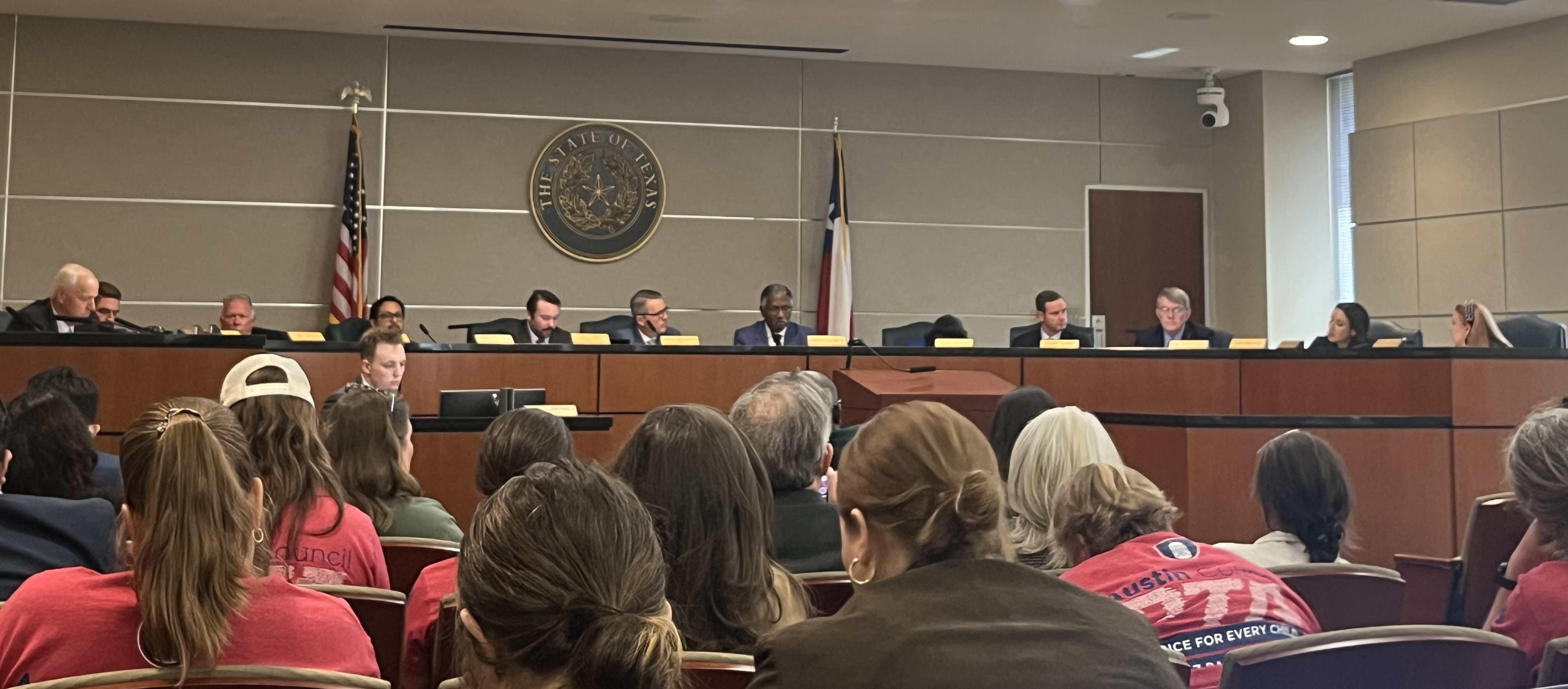Teach the Vote's Week in Review: Feb. 17, 2017

Date Posted: 2/17/2017 | Author: Jennifer Mitchell, CAE
The weekend is here, and it's time for your wrap-up of education news from ATPE:
 ATPE members were at the State Capitol Monday morning to express opposition to Senate Bill 13, an anti-educator bill aimed at weakening educator associations by doing away with payroll deduction options for certain public employees who join associations or unions.
This week, the Senate State Affairs Committee approved Senate Bill (SB) 13 by Sen. Joan Huffman (R-Houston), who is also that committee's chairwoman. The bill aims to prevent educators and a handful of other public employees from using payroll deduction for their voluntary association dues, a longstanding practice that costs taxpayers nothing.
Huffman's bill carves out a special exemption for fire, police, and EMS employees, allowing them to continuing using payroll deduction for their dues. That decision to favor some public employees over others is not sitting well with many public servants both in and out of the bill, as well as several of the legislators being asked to act upon the issue this session.
ATPE members were at the State Capitol Monday morning to express opposition to Senate Bill 13, an anti-educator bill aimed at weakening educator associations by doing away with payroll deduction options for certain public employees who join associations or unions.
This week, the Senate State Affairs Committee approved Senate Bill (SB) 13 by Sen. Joan Huffman (R-Houston), who is also that committee's chairwoman. The bill aims to prevent educators and a handful of other public employees from using payroll deduction for their voluntary association dues, a longstanding practice that costs taxpayers nothing.
Huffman's bill carves out a special exemption for fire, police, and EMS employees, allowing them to continuing using payroll deduction for their dues. That decision to favor some public employees over others is not sitting well with many public servants both in and out of the bill, as well as several of the legislators being asked to act upon the issue this session.
 Dozens of ATPE members traveled to Austin on Monday, Feb. 13, to attend and testify at the SB 13 hearing. Read more about their testimony in this blog post by ATPE Governmental Relations Director Jennifer Canaday from earlier this week. The pleas by educators and others were not enough to stop the committee from moving the bill forward, which happened yesterday on a party line vote. For more on this high-profile battle over public employee associations and unions, check out today's column by Ross Ramsey, Executive Editor of the Texas Tribune, which is also republished here on Teach the Vote.
As Ramsey notes, the debate over SB 13 "isn’t about the paychecks. It’s about the politics." ATPE agrees, and points out that political motives driving this bill aren't even necessarily union-focused, especially since the bill creates exceptions for some union members. Backers of SB 13 say they are targeting the groups they perceive to be opponents of Republican candidates and supporters of state and federal legislation that would hurt businesses. In reality though, the largest group affected by the bill is ATPE – a non-union entity that exists only in Texas and gets no money from national or out-of-state affiliates. Furthermore, as ATPE members and lobbyists have pointed out in testimony and one-on-one discussions with lawmakers, our organization has not involved itself in business-related legislation and has always made bipartisan contributions to candidates and officeholders through our political action committee, which is not in any way funded with dues dollars.
If, as Ramsey describes it, the SB 13 debate boils down to picking "good eggs and bad eggs," it is becoming abundantly clear that in the minds of many lawmakers and business groups, educators are the bad eggs.
Dozens of ATPE members traveled to Austin on Monday, Feb. 13, to attend and testify at the SB 13 hearing. Read more about their testimony in this blog post by ATPE Governmental Relations Director Jennifer Canaday from earlier this week. The pleas by educators and others were not enough to stop the committee from moving the bill forward, which happened yesterday on a party line vote. For more on this high-profile battle over public employee associations and unions, check out today's column by Ross Ramsey, Executive Editor of the Texas Tribune, which is also republished here on Teach the Vote.
As Ramsey notes, the debate over SB 13 "isn’t about the paychecks. It’s about the politics." ATPE agrees, and points out that political motives driving this bill aren't even necessarily union-focused, especially since the bill creates exceptions for some union members. Backers of SB 13 say they are targeting the groups they perceive to be opponents of Republican candidates and supporters of state and federal legislation that would hurt businesses. In reality though, the largest group affected by the bill is ATPE – a non-union entity that exists only in Texas and gets no money from national or out-of-state affiliates. Furthermore, as ATPE members and lobbyists have pointed out in testimony and one-on-one discussions with lawmakers, our organization has not involved itself in business-related legislation and has always made bipartisan contributions to candidates and officeholders through our political action committee, which is not in any way funded with dues dollars.
If, as Ramsey describes it, the SB 13 debate boils down to picking "good eggs and bad eggs," it is becoming abundantly clear that in the minds of many lawmakers and business groups, educators are the bad eggs.
 The 85th Legislature is considering some dramatic changes to healthcare options for educators. ATPE Lobbyist Monty Exter has written an analysis of a bill that would result in a major restructuring of TRS-ActiveCare, the primary healthcare program for actively employed educators in Texas. Read more about Senate Bill 789 and the changes being considered in this blog post.
The 85th Legislature is considering some dramatic changes to healthcare options for educators. ATPE Lobbyist Monty Exter has written an analysis of a bill that would result in a major restructuring of TRS-ActiveCare, the primary healthcare program for actively employed educators in Texas. Read more about Senate Bill 789 and the changes being considered in this blog post.
The Texas Education Agency (TEA) wants to hear from educators about potential changes to educator certification, particularly for teachers of early childhood students. We invite educators to take TEA's survey between now and Feb. 24, especially if you teach in an elementary grade and might be affected by these changes under consideration. Learn more about the background of the issue and find a survey link in ATPE Lobbyist Kate Kuhlmann's blog post.
 School districts and charter schools around Texas received notice of their 2016-17 accreditation status from the Texas Education Agency (TEA). Factors that count toward a determination of accreditation status include academic and financial accountability ratings, program effectiveness, and compliance with education laws and rules. Nearly all (98%) of the state's school districts received a fully "Accredited" status. Nine districts or charters were "Accredited-Warned," seven received an "Accredited-Probation" status, two were marked as "Not Accredited-Revoked," and one district is still "Pending." Learn more from TEA here.
School districts and charter schools around Texas received notice of their 2016-17 accreditation status from the Texas Education Agency (TEA). Factors that count toward a determination of accreditation status include academic and financial accountability ratings, program effectiveness, and compliance with education laws and rules. Nearly all (98%) of the state's school districts received a fully "Accredited" status. Nine districts or charters were "Accredited-Warned," seven received an "Accredited-Probation" status, two were marked as "Not Accredited-Revoked," and one district is still "Pending." Learn more from TEA here.
Stay tuned to Teach the Vote and follow us on Twitter for updates on legislative developments next week. ATPE members are also urged to visit Advocacy Central to learn more about specific bills and send messages to their lawmakers about priority issues like payroll deduction, private school vouchers, testing, healthcare, and more.
CONVERSATION
RECOMMENDED FOR YOU

04/04/2025
Teach the Vote’s Week in Review: April 4, 2025
Lawmakers tackle vouchers, school finance, payroll deduction, and much more in another jam-packed week at the Capitol.

04/04/2025
Texas Senate passes bill that aims to support Texas teachers
Here’s what you need to know about the latest version of Senate Bill 27.

04/04/2025
House Public Education Committee advances voucher bill, school finance
Although the delayed hearing took place in a room with audiovisual capabilities, it was not broadcast by the House—a decision Democratic committee members questioned.

